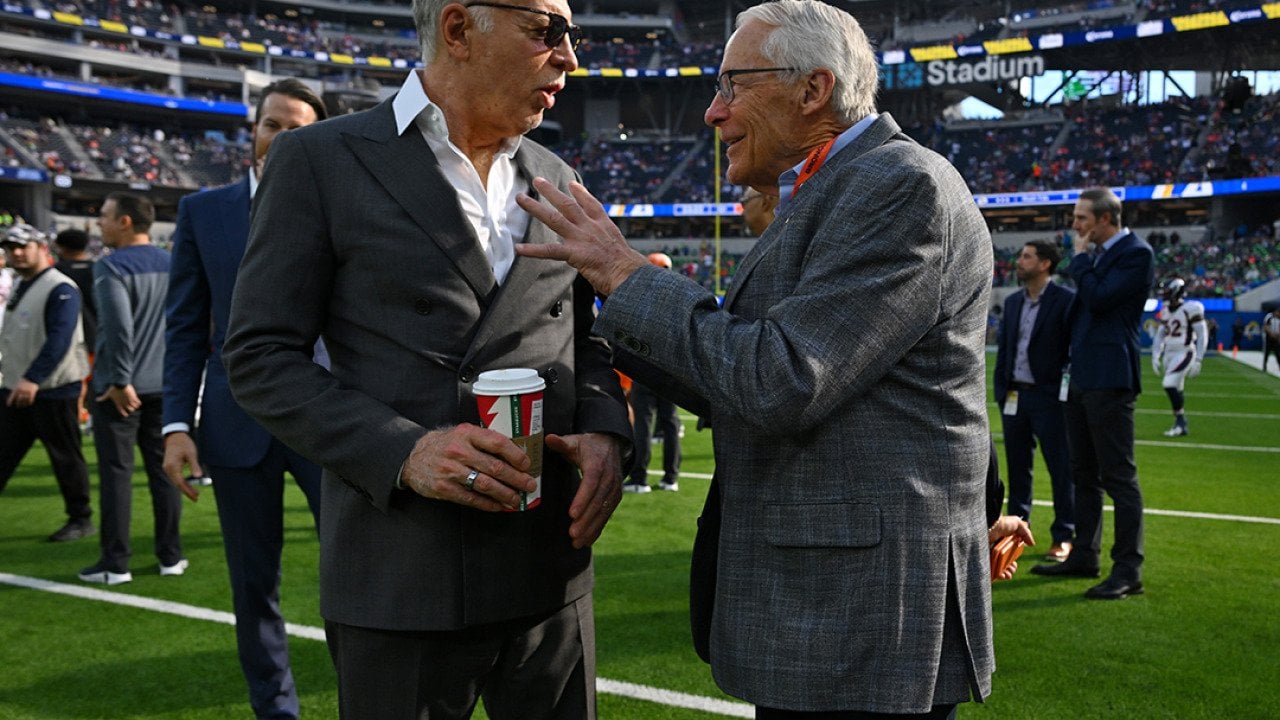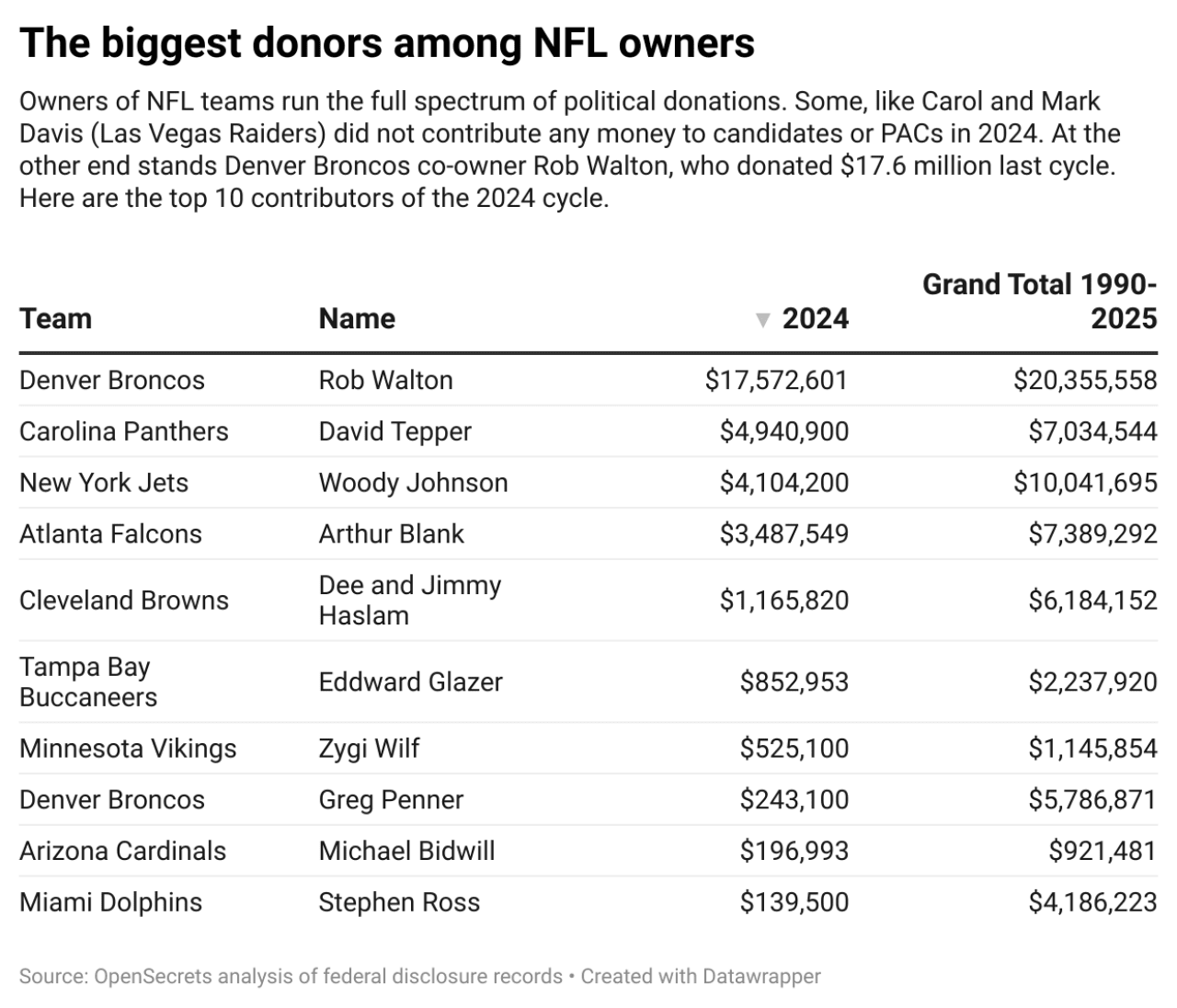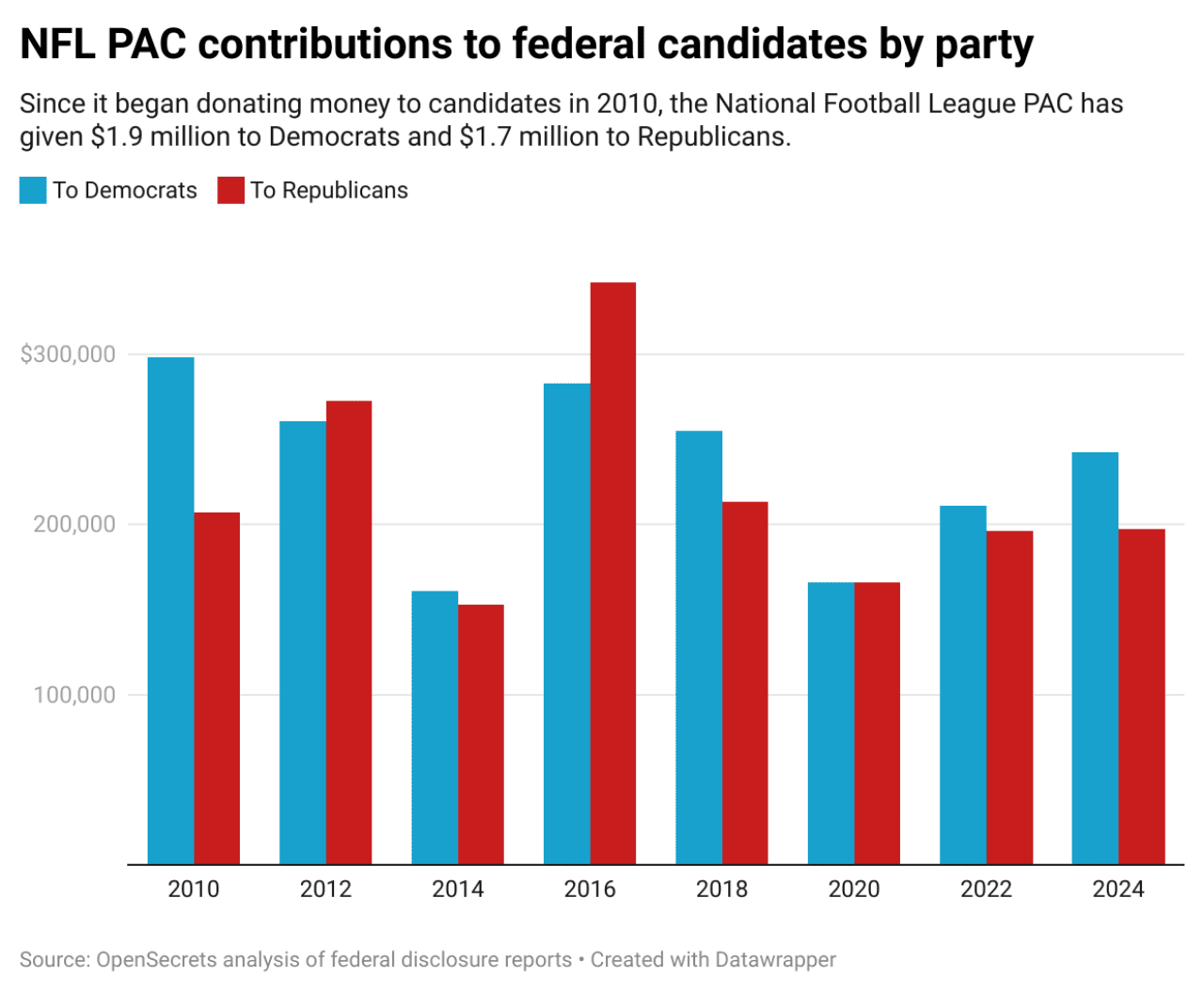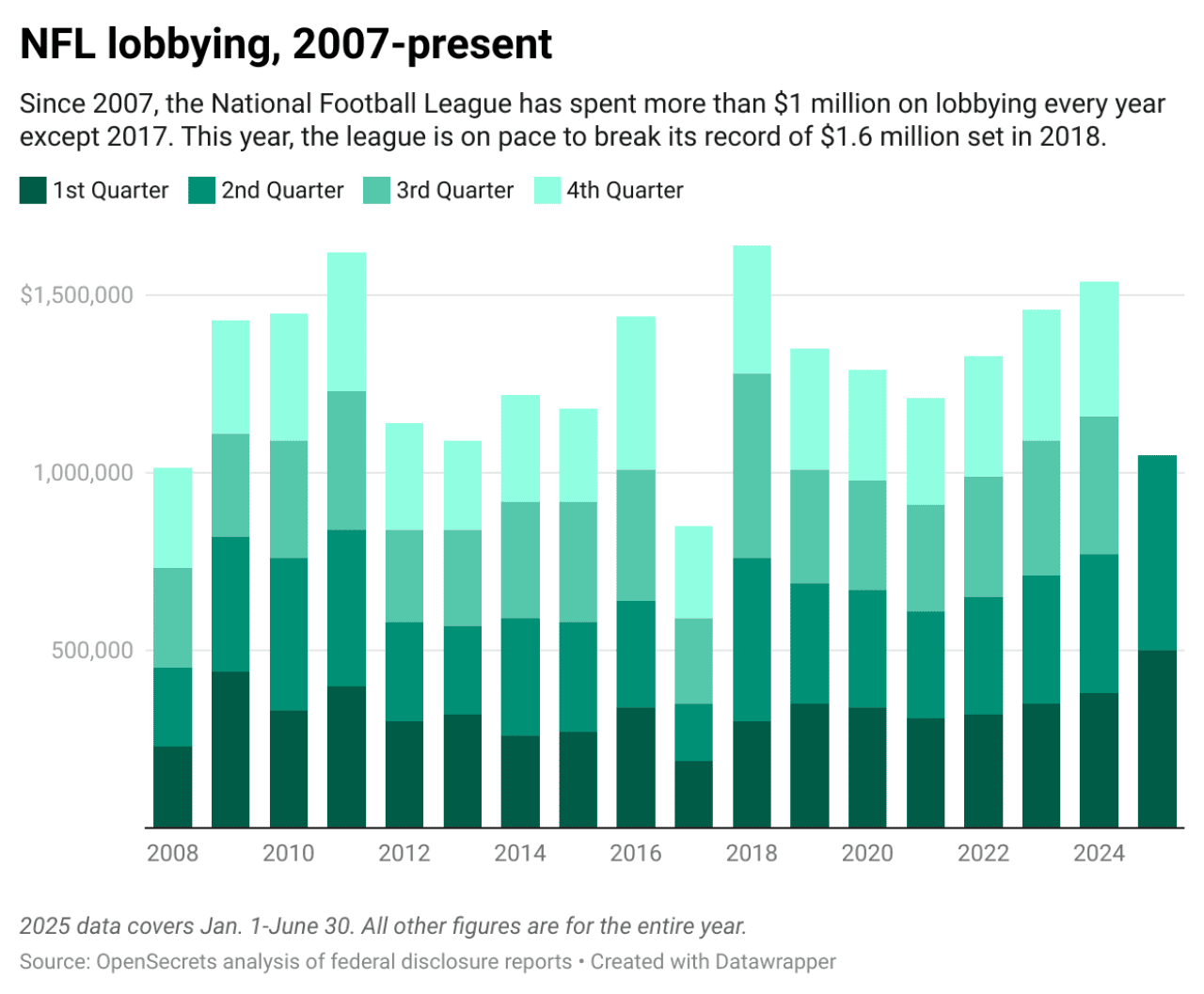The NFL plays politics, not just football

Jayne Kamin-Oncea // Getty Images
The NFL plays politics, not just football
Ahead of the start of its 106th season, the National Football League saw an astonishing 710% increase in value over the past two decades, with teams worth a collective $190 billion. The owners, many of whom have been involved with their teams for decades, are turning to new ways to capitalize on the exponential gains seen in the league — and to look out for their own interests.
The NFL generated $23 billion in revenue in 2024, nearing Commissioner Roger Goodell’s goal of $25 billion by 2027. This goal, set in 2010 when NFL revenue just crossed $8 billion, has been kept on course by a slew of ever-increasing media rights deals and partnerships.
And like any successful industry, the league (and team owners) apply some of those earnings toward political influence. For example, in recent years, the league pushed for improved access to life-saving medical equipment, paved the way for new stadiums and ensured that facilities are protected from possible drone threats.
During the 2024 election cycle, 58% of federal campaign contributions made by an NFL-affiliated political action committee and league employees went to Democrats. The vast majority of that money — 86% — was donated by the PAC, which acts as a collective for all the teams, whereas employees may donate based on their own personal preferences. The league uses a PAC because, like any other corporation, it may not make contributions directly from its own treasury.
This was the fourth consecutive election cycle in which the league favored the Democratic Party. The biggest recipients were the Democratic Congressional Campaign Committee ($123,000) and the Democratic Senatorial Campaign Committee ($95,000), followed by the National Republican Senatorial Committee ($55,000) and the National Republican Congressional Committee ($30,000). Nearly all of the money given to those GOP committees came from PACs.
The league has also been active throughout the past few years in lobbying, focusing most of its efforts on changing drone laws and advocating for legislation to place more automated external defibrillators in schools. The NFL spent $1.5 million on lobbying in 2024, the most it had spent since 2018. It has already spent $1 million through the first half of 2025.
The NFL is composed of 32 teams and owners, who are primarily divided up as old-money families, groups of collective investors or individuals. The NFL itself is not publicly traded, and 31 of its 32 teams are private. The sole team that isn’t, the Green Bay Packers, makes public much of the data on its revenue and sales. The Packers are also a nonprofit, where no single person is allowed to own more than 4% of all shares.
OpenSecrets dug through the numbers to see how the league and team owners attempt to use their wealth to influence politics. Many teams have multiple owners who take minority stakes, but for the purpose of this research, OpenSecrets focused primarily on the majority owners.
The wealthiest owner (and biggest donor)
Rob Walton, half of the Denver Broncos ownership team (the other half is held by his son-in-law Greg Penner), has a net worth of $110.4 billion and is the 13th richest person in the world. He is the oldest child of Walmart founder Sam Walton and served as chairman of the company’s board of directors from 1992 to 2015.
During the 2024 election cycle, Walton donated $17.6 million, primarily to Republican candidates and organizations, more than triple the next biggest donor among league owners. His heftiest donations were:
- $5 million to Americans for Prosperity Action (a hybrid PAC/super PAC affiliated with the Koch family).
- $2 million to America Leads Action (a super PAC backing Republican House candidates)
- $2 million to the Senate Leadership Fund (a super PAC supporting Republican Senate candidates).
- $1 million to Conservative Values for Utah (a super PAC that supports Sen. John Curtis).
Prior to 2022, Walton had never donated more than $190,000 in any given election. That cycle, he contributed $2.2 million, with $2 million going to Americans for Prosperity Action. He donated another $35,000 to the National Republican Senatorial Committee and $25,000 to Florida Gov. Ron Desantis (R). The remainder was spread out among mostly Republican congressional candidates.
He also donated significantly — $375,000 in 2022 — to environmental conservation movements in Colorado, by way of the Conservation Colorado Victory Fund.
The other seven-figure donors
The owners of four other teams donated at least $1 million in the 2024 cycle.

OpenSecrets
David Tepper, owner of the Carolina Panthers, is worth $21.3 billion thanks to his hedge fund. Along with owning Major League Soccer’s Charlotte FC and formerly owning a stake in the Pittsburgh Steelers, Tepper bought the Panthers — now valued at $5.9 billion — for $2.3 billion in 2018. He was the second biggest donor to political causes in 2024, contributing $4.9 million, with nearly all of it ($4.2 million) going to the SFA Fund, a hybrid political action committee that supported Nikki Haley’s campaign for the Republican presidential nomination. In 2023, Tepper also donated half a million dollars to the Tell It Like It Is PAC, which supported Republican Chris Christie’s presidential bid.
New York Jets owner Woody Johnson, a close ally of President Donald Trump, donated $4.1 million. He and his wife spread the contributions among a variety of Republican candidates and party committees, but the biggest transaction was a $1 million contribution to Make America Great Again Inc., the super PAC supporting Trump’s 2024 campaign. Johnson donated $1 million to Republican causes during the 2016 campaign, after which he was named ambassador to the United Kingdom by Trump. In 2020, he gave $3.1 million, including $1 million to the Trump-supporting super PAC American First Action.
Arthur Blank, owner of the Atlanta Falcons, donated $3.5 million. That total included $2 million for Unite America, a nonpartisan philanthropic venture fund that supports democracy reform initiatives. Blank made $2.5 million in political donations during the 2020 cycle, including $2 million that went to the Senate Majority PAC, a super PAC backing Democratic efforts to win control of the Senate.
Dee and Jimmy Haslam, owners of the Cleveland Browns, round out the seven-figure club. They donated $1.2 million in 2024, giving to candidates, party committees and PACs in the Republican column. Their biggest contributions were $100,000 donations to a pair of super PACs: the Sentinel Action Fund and the Senate Leadership Fund.
The defending Super Bowl champ
Jeffrey Lurie’s Philadelphia Eagles won the Super Bowl in February 2025 and are among the favorites this season. But Lurie is far from a leader when it comes to influencing the government with his wallet.
During the 2024 cycle, he donated just $61,000, in the middle of the range for his political giving in recent cycles. Since 2008, his total political donations have ranged from $24,000 to $94,000.
The biggest contributions Lurie and his wife, Christina, have since 2008 made annual contributions of $5,000 to the NFL’s PAC, which has favored Democrats in the four most recent elections. They donated another $5,000 to a left-leaning hybrid PAC. The remainder of their donations went to Democratic candidates.
The Gridiron PAC
The NFL, like other leagues, maintains a political action committee that it uses to support political candidates. The NFL’s Gridiron PAC began making political donations during the 2010 election cycle and, since then, has demonstrated a near equal split in its contributions to Democrats and Republicans, donating a total of $1.9 million to Democrats and $1.7 million to Republicans.

OpenSecrets
The PAC is primarily funded by teams, owners and their families, and team executives. Most of the 172 people and organizations that donated to the NFL PAC in 2023 and 2024 gave the maximum of $5,000.
It gave the maximum of $10,000 ($5,000 for a primary race and the same for a general election) to four House candidates last cycle: House Minority Leader Hakeem Jeffries (D-N.Y.) and Reps. Jerrold Nadler (D-N.Y.), Richard Neal (D-Mass.) and Guy Reschenthaler (R-Pa.). The remainder of the PAC’s top 10 recipients were all Republicans.
The biggest beneficiaries on the other side of the Capitol were Sens. Amy Klobuchar (D-Minn.), who received $10,000; John Barrasso (R-Wyo.), $7,500; and Eric Schmitt (R-Mo.), $5,500.
The players’ union also has a political action committee, the NFL Players Association One Team PAC, but it has mostly stayed out of politics since the 2020 election.
Lobbying
The league has a significant lobbying presence in Washington, D.C., having spent $1.5 million to influence policy in both 2023 and 2024. Through June 30, the league was well ahead of the record pace set in 2018, when it spent $1.6 million on lobbying.

OpenSecrets
The NFL is also deploying more lobbyists than ever before. As of June 30, the league had employed or contracted 41 people to represent its interests in D.C., up from the previous high of 30 people it used in 2023.
Last year, the league used five lobbying firms, in addition to its in-house lobbyists. The firms earning the most from the league were FGS Global ($360,000) and Capitol Counsel ($320,000).
So far in 2025, the NFL has used nine lobbying firms. FGS Global is still the top-earning firm, but one of the new firms — Ballard Partners — has jumped into the second spot. Ballard has deep ties to the Trump administration, which it has leveraged to become one of the highest-earning firms.
In 2024, the NFL directed its lobbyists to primarily work on issues related to legislation that would:
- Empower federal, state and local governments to improve security against threats posed by drones.
- Expand access to automated external defibrillators (AEDs) in schools and increase CPR training.
- Enable Washington, D.C., to revitalize the site of RFK Stadium so the Washington Commanders can build a new stadium.
This year, the league’s attention remains on the AED legislation. The RFK bill was signed into law by President Joe Biden. The drone bill has not been reintroduced in the 119th Congress.
This story was produced by OpenSecrets and reviewed and distributed by Stacker.
![]()
